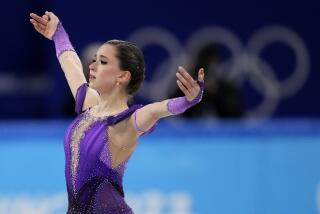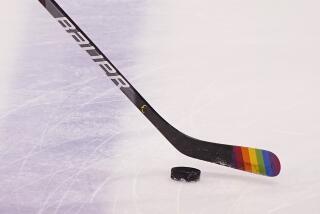Column:: Lack of NHL players became great equalizer, but most everyone wants them back at Olympics
The NHL’s refusal to allow players to represent their homelands in the Pyeongchang Winter Games turned out to be a vast equalizer in the men’s hockey tournament that concluded early Sunday morning between Germany and the Olympic Athletes from Russia.
Teams that had little chance against star-powered rosters assembled by Canada, the U.S., and other top-ranked nations in the last five Winter Games turned into contenders here.
With everybody using third-tier players who aren’t in the NHL because they lack size, speed, or the taste for physicality, no one had a clear advantage. The decisive factors became a good goaltender, an opportunistic forward, or an effective trap defense like the one favored by 10th-seeded Germany, which eliminated Sweden in the quarterfinals and held off defending champion Canada in the semifinals.
But even those who gained the most from the absence of NHL players missed them.
“The best players should be in the Olympics. The NHL guys should be in the Olympics,” Germany coach Marco Sturm said. “That’s just what the event is for. I hope that in the future they will be back on Olympic ice.”
Without them, Czech goalie Pavel Francouz of the KHL’s Traktor Chelyabinsk got his star turn. He has seized the moment, compiling a 1.53 goals-against average and .934 save percentage as his team lost 3-0 in the semifinals to the Olympic Athletes from Russia. He still wished the tournament had been best against best.
“Of course it’s a big chance for other players,” he said, “but I think it would be better if NHL players are here.”
They might not return at the 2022 Beijing Games, NHL Commissioner Gary Bettman said this week at the MIT Sloan Sports Analytics Conference.
“I don’t know that we want to go to China,” he said. “I think going to the Olympics is incredibly disruptive on a season.”
It’s not as disruptive as the three lockouts Bettman has imposed, and it invigorates players by inspiring national pride. It promotes the game globally, too. Threatening to keep players home again gives Bettman a bargaining chip in the next labor talks, though there’s time for that to be resolved. This tournament lost its luster without them.
There were few surprises in the women’s competition, which ended with the U.S. beating Canada in a shootout to prevail for the first time since 1998. Canada and the U.S. remain the only teams that have won Olympic gold and they’ve met in every final except 2006, when the U.S. lost in the semifinals. Finland, the bronze medalist here for the third time, has produced a few good players and Swiss forward Alina Muller, who signed to play for Northeastern University, was voted the most valuable player, but no country has developed the depth to challenge the top two for supremacy.
College hockey has been a prime talent source for women’s Olympic teams but its growth seems to have plateaued. There were 30 women’s teams in NCAA Divisions I, II and III in 1997, 40 teams in 1998 and 100 for the 2016-17 season, but in recent years North Dakota, Wayne State and Niagara dropped their women’s programs and the number of Division I programs has stayed around 35. The 2022 Olympic tournament will add two teams for a total of 10, which will strain the pool of available talent.
The U.S. women’s victory launched them into a whirlwind of parties and TV appearances in response to their new popularity. Patriotism and curiosity often draw casual fans to watch Olympic events but the Americans hope their fame will endure and become a catalyst in accelerating the sport’s growth.
“I think it’s always huge, every fourth year, for people to be watching this type of game,” forward Amanda Pelkey said. “It’s a game that back at home, they all had a blast watching it, full of energy. I think it will absolutely bring more awareness.”
Gigi Marvin of Warroad, Minn., said she hopes that in the next four years women’s hockey “skyrockets and it will continue to skyrocket and everyone in America is going to wake up. Even my high school team — they’re in the state tournament — and some of those girls are going to grow up and be following in our path.”
The U.S. women were vocal in pushing USA Hockey, the sport’s governing body, to establish development programs for young girls as part of an agreement that averted a players’ boycott of last year’s world championships. Forward Hilary Knight wisely suggested the U.S. share its knowledge and assets in the interest of strengthening the sport by making it more competitive.
“I think women’s hockey’s grown quite a bit most recently,” she said, “but if anything, I think we need to lend more resources to other countries and really develop and get younger girls interested in the game at a younger age and offer that support if they want to come to the U.S. or wherever it may be, really nourish and help them attain the level that they want to play at. I think that growth will be contagious around the world, and hopefully we can have more countries competing at the Olympics.”
Cultural and financial obstacles make that difficult. But if the U.S. women’s success here can lead to a better, stronger sport, its legacy will resonate beyond what happened on the ice on a chilly night in Pyeongchang.
Follow Helene Elliott on Twitter @helenenothelen
More to Read
Go beyond the scoreboard
Get the latest on L.A.'s teams in the daily Sports Report newsletter.
You may occasionally receive promotional content from the Los Angeles Times.






